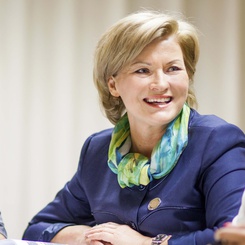With Anne-Claire Pache and Marie-Laure Djelic
According to the traditional paradigm that has thrived for most of the 20th century, businesses answer first and foremost to their shareholders, and above all in terms of profitability. The financial crisis brutally revealed that there was something fundamentally wrong with this picture and reminded us that a business relies on more than just its shareholders. Indeed, businesses also rely on manufacturers, consumers, communities and society at large, without whom they could not exist.
Is that traditional paradigm therefore on its way out? Unfortunately, changing the way many business leaders and decision makers think about business is much easier said than done. And so long as the shareholder is king and other stakeholders sidelined, societies will continue to suffer the consequences.
The good news: generation “Y” has it in its power to break with tradition and really start to build a new narrative around business and its “raison d’être”. This is something that ESSEC Business School feels strongly about as it investigates “the role of business in society.”
The school recently had the pleasure of receiving Darden Professor R. Edward Freeman – invited jointly by the ESSEC Institute for Innovation and Social Entrepreneurship (IIES) and the ESSEC Center for Capitalism, Globalization and Governance (C2G2). Professor Freeman is a world-renowned business ethics expert and international voice for Stakeholder Theory, which proposes a more holistic narrative for businesses
A new understanding of business’ role in society
40 years ago, when Professor Freeman tried to publish a paper entitled ‘Stakeholder theory’, publishers just assumed that he’d made a mistake: “They said, no problem, we’ll list your paper… but we know you mean shareholder management. Or is it stockholder management?”
Today, companies are talking more and more about sustainability and about Corporate Social Responsibility (CSR), and some public pressure is there, but this new story is still largely embryonic. Stakeholder theory is really what is going to help move things forward and build a new understanding around business’ role in society.
“Stakeholder theory isn’t a way for companies to protect themselves from public pressure, avoid conflict or mend a crisis situation,” says Anne Claire-Pache, Professor of Public and Private Policy at ESSEC Business School and Director of the School’s Philanthropy Chair. “Stakeholder theory is about generating value in new ways that take business and societal interdependencies into account and building on them.”
Trailblazers like Freeman have helped bring “stakeholder theory” – and questioning the broader responsibilities of business – into the mainstream. But how can this increasingly mainstream way of thinking turn into day to day reality?
A new generation of business leaders
Generation “Y” holds the key to the new paradigm, first and foremost because they have more and more opportunity to learn about the responsibility of business. They’re feeling the public pressure stemming from this image of “big, bad business” and they’re more sensitive to ideas of “responsibility” in the classroom. So business schools are playing a role in shaping the future – for the most part.
“Unfortunately, the shareholder paradigm is still predominately taught within the business schools,” explains Marie-Laure Djelic, professor of Management at ESSEC Business School and Director of the school transversal research Center for Capitalism, Globalization and Governance. “ESSEC for one has identified business’ role in society as one of its primary concerns and stakeholder theory is helping us think about the firm in a different way. But this is far from being everywhere the case.”
“Furthermore, most business schools and research centers need more intellectual diversity to really help build a new paradigm. We need ideas from anthropology, geography, sociology and political science. We need to encourage this kind of trans-disciplinary intellectual setting.”
A new generation of businesses
Professor Pache believes that business schools – and ESSEC in particular – can play an important role by training tomorrow’s social entrepreneurs.
“Entrepreneurs create new organizations, they create new business models and they are in a great position to build this new paradigm,” she says. “Indeed, new entrepreneurs are more likely to want to break out of the status quo and think beyond just generating profits.” In established businesses, cognitive processes make it difficult to change things. Entrepreneurs, on the other are at the cutting-edge of change.
Marie Laure Djelic’s trans disciplinary research Center for Capitalism, Globalization and Governance will host their next forum on December 19th on the subject: Globalization and Finance.









